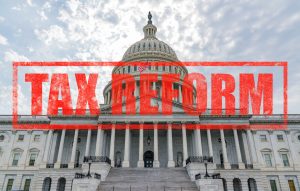 The Tax Cut and Jobs Act (TCJA) was signed into law on December 22, 2017, and took effect on January 1, 2018. Included in the political promise of tax simplicity and historically large tax cuts to middle-income households were amendments to existing tax code, including Code Section 1031. Investment property owners will continue to be able to defer capital gains taxes using 1031 tax-deferred exchanges, which have been in the tax code since 1921.
The Tax Cut and Jobs Act (TCJA) was signed into law on December 22, 2017, and took effect on January 1, 2018. Included in the political promise of tax simplicity and historically large tax cuts to middle-income households were amendments to existing tax code, including Code Section 1031. Investment property owners will continue to be able to defer capital gains taxes using 1031 tax-deferred exchanges, which have been in the tax code since 1921.
What changes under the new tax law?
The tax law repealed 1031 exchanges for all other types of property that are not real property. This means 1031 exchanges of personal property, assets that can no longer be exchanged including collectibles, franchise licenses, and patents, aircraft, machinery, boats, livestock, and artwork.
What didn’t change for 1031 exchanges?
Real estate exchanges are subject to the same rules and requirements as prior law. Taxpayers must still identify their replacement within 45 days and exchange within 180 days. All real estate in the United States, improved and unimproved, also remains like-kind to all other domestic real estate. Foreign real estate continues to be treated as not like-kind to real estate.
Are there timing considerations?
Pursuant to the transition rules, a personal property exchange to be completed in 2018 would be afforded tax deferral under the prior law if the relinquished property was sold or the replacement property was acquired by the taxpayer prior to December 31, 2017.
What about cost segregation?
A cost segregation study identifies and reclassifies personal property assets to shorten the depreciation time for taxation purposes, which reduces current income taxes. Taxpayers entering into a 1031 exchange who are contemplating a cost segregation study, need to consider the disallowance of personal property as like-kind to real property. Reclassifying asses to shorter recovery periods will increase annual depreciation deductions, but can potentially cause gain recognition from the exchange.
We’ve got your back
The new tax code is complex and every taxpayer’s situation is different, especially when real estate is involved – so don’t go it alone! Check out the New Tax Law Explained! for Individuals and then contact me at sfilip@krscpas.com or 201.655.7411 to discuss tax planning and your real estate investments under the TCJA.







 Before the
Before the  Tax Cuts and Jobs Act (“TCJA”)
Tax Cuts and Jobs Act (“TCJA”)